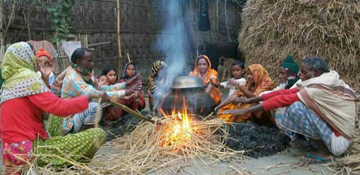RAJSHAHI, Jan 6, 2018 (BSS)-The unusual cold biting is disrupting normal life in the city and its adjacent areas for the last couple of days as the difference between maximum and minimum temperature was further reduced here during the past 24 hours.
The minimum temperatures marked further falls at most places and blowing cooler winds from the northwestern region deteriorated the situation making life miserable.
Normal works including farm activities remained affected, fewer people were found out of their homes due to shivering cold in the morning.
Local Met office recorded the season’s ever lowest temperature of 5.8 degrees Celsius this morning against the yesterday’s 8.5 degrees Celsius making the business of warm clothes more vibrant.
Meanwhile, life of the people living in the slums and chars on the Ganges basin has become worst as they experience more cold biting than that of the mainland.
Akbarul Hassan Millat, Editor of Daily Sonar Desh, said the unusual situation has been preventing people from going outside of residences in the morning along with creating adverse impact on normal life.
The sufferings of daily wage earners like day labourers, rickshaw pullers, traffic police and farm labourers have also been intensified during the severity of the cold biting.
The number of patients suffering from cough, fever, asthma and other acute respiratory tract infections sharply increased at different hospitals including Rajshahi Medical College and Hospital (RMCH) for the last couple of days, said Dr Khalilur Rahman, Associate Professor of Department of Medicine in RMCH.
In addition to the sufferings of the people, particularly the poor, cultivation, especially potato, chilli and Irri-Boro and pisciculture might be affected if the situation prolongs, said Dev Dulal Dhali, Deputy Director of Department of Agriculture Extension.
Meanwhile, the district and upazila administrations, authorities, organizations, public and private bodies and many NGOs have intensified distribution of warm clothes among the distressed cold-hit people.



